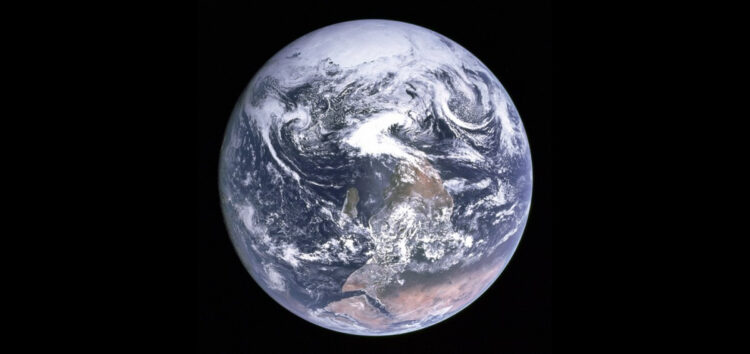Oddly enough the overriding sensation I got looking at the earth was, my god that little thing is so fragile out there.” ~ Michael Collins, Apollo 17 Astronaut
Just for a moment, stare at the picture of the earth on this page. You and I are neighbors. I can see your house from here.
We think of the earth as incredibly large and very small, as the most solid entity we can imagine and, yet, somehow the most fragile. To the best of our knowledge, it is the only place in the entire known universe where elephants can be found.
Or any life for that matter.
During the history of the human race, we have been pilgrims, wayfarers, explorers and pioneers. Our feet and minds have carried us far. We migrated out of Africa and spread across the planet in search of food, fortune and, sometimes, just the horizon. But we did so in a thinly populated world with what seemed to be limitless resources.
We are fast approaching 8.5 billion humans on the planet. Getting along with the earth, and with each other, will be increasingly important.
Certainly, the travel industry is not without its problems. Tour operators and cruise lines operate without a great deal of oversight, even in the face of legal regulation and social pressure. Too often, a bit of excess oil is intentionally dumped overboard in our oceans or fragile environmental systems face the consequences of increasing numbers of affluent tourists. Climate change now hangs heavy over many destinations as ocean levels rise and glaciers melt. The ivory trade threatens the very existence of the planet’s largest mammals as thousands of elephants and rhinos are slaughtered for trinkets and pseudo medicines.
In many cases, the real cost of the environmental impact is “off-balance-sheet” – absorbed by the environment rather than by the traveler. The cumulative effects often show in places where we least want to observe the impact of humanity. But it is not only the environment per se that bears the brunt of tourism’s numbers. Trafficking in human slavery, the exploitation of animals, and of cheap labor are all intersected at some point by the traveler. These are not esoteric causes, but problems at the heart of some of the planet’s most correctable pathologies. Some of the key points worth noting:
- While consumers believe travel service suppliers should be good stewards of their environment, over half (54%) also believe that individual travelers themselves have the greatest responsibility for preserving and protecting the environment.
- Six out of ten (58%) travelers say they believe that environmental programs in the travel industry could have a positive effect on the environment.
- The majority (51%) of consumers will continue to patronize “green” travel service suppliers regardless of an economic downturn. Nearly half (48%) of travelers say that continuing to support environmentally responsible travel service suppliers is a necessity, even in an economic downturn.
- Less than one-third (29%) say it is easy to find out about environmental policies and initiatives of travel service suppliers
These key findings hold the promise of gradual evolution to a more sustainable travel ethic. We can all be an important catalyst in the transformation of travel from a 19th-century model to a 21st-century ideal. Some would argue that travel is a privilege of the wealthy and wastes resources like vast amounts of fuel, exploiting indigenous people and ecosystems. At times, travel and tourism do all of these things, and perhaps even worse than we realize.
But travel also expands our understanding of other people and cultures. Travel reminds us of how alike we are. Travel reminds us of the fragility of the planet and seldom do we travel that we return unchanged.
Our travels can still be inspired by a spirit of that same curiosity that drove our ancestors toward the horizon, but this time perhaps with an increased awareness of the need to travel with an attitude respecting the road, the people we visit, and those with whom we travel.


